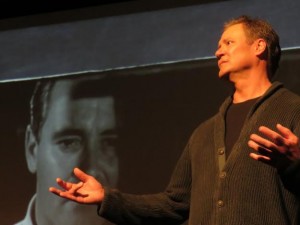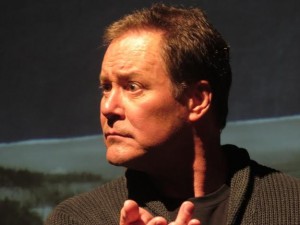
Jack Lemmon created many characters during his illustrious movie career but never the fatherly ghost who materializes through a painful and loving relationship with his son.
Chris Lemmon isn’t haunted by his famous father who died at 76 in 2001. But the son is consumed by the idea of honoring Jack Lemmon’s memory, not just as an Academy Award-winning actor, but also a guy he called, “Pops.”
Lemmon humanized his father in a sometimes joyful and sometimes heart-breaking way Saturday night in the Mount Dora Community Building. It was all part of the one-man play, “A Twist of Lemmon.” That was the same title Chris Lemmon, 60, used for a 2006 book detailing the father/son relationship.
Chris Lemmon played Jack Lemmon on stage for about 90 minutes. He also played the piano and wrote much of the musical score. It all comes together in the story of Jack’s life, from his early days as a struggling actor to a Hollywood star and then, finally, as an elderly man facing death.
You can see a clip of Chris talking about his father on the Villages-News.com Facebook page: https://www.facebook.com/TheVillagesNews
Divorce separated father and son, when Chris was still a child. Over the years, they drifted apart and eventually reconciled. Along the way, Jack battled alcoholism, kept challenging himself in front of the camera and regretted not spending enough time with a kid he called, “Hotshot.”
Fourteen years ago, when Jack Lemmon knew he was dying, he spoke to his son. Jack told him, “You’re an actor,” and added Chris should make people laugh and cry at the same time.
That’s what actors named Lemmon do.

Jack Lemmon possessed an uncanny ability to delicately dance on that thin line between tragedy and comedy. That ability was best illustrated in Lemmon’s Academy award-nominated performance in “The Apartment,” from 1960.
On the surface, it’s a comedy about an employee who keeps lending his apartment key to philandering superiors. Everything is fun and games until Lemmon falls in love with one of his bosses’ nightly companions.
“It’s a story about love and lies, and people get hurt,” Jack says from the stage.
Dealing with such hurt was one of the enduring lessons of Jack Lemmon’s life and in his final days, he told his son to care for those close to him.
“You’re a father,” he says to Chris on stage. “Be there for your children. I’m sorry for the times I wasn’t there for you. But those times we had together were magic.”
Magic is the proper adjective to describe Chris Lemmon’s performance, playwriting and musical ability. You sit in the audience before the start of the play and feel like you know Jack Lemmon because of his movies.
But that man on the screen is really a stranger to most of us. Chris Lemmon reveals a much more complex and deeper human being. The play tells about a man who discovers and maximizes his talent but somehow loses what really matters: his family.
The height of Jack Lemmon’s early career came in 1955 when he won an Oscar for Best Supporting Actor in “Mister Roberts.” On the night of the Academy Awards, Lemmon was so busy going to parties and basking in the Hollywood limelight, he left his wife alone and forgot to take her home. Cynthia Stone took a cab and later filed for divorce.
Chris Lemmon is up there on stage reliving the darkest days of his father’s relationship with his mother. “The bond was broken,” Chris says as Jack with a melancholy gaze and soft voice. “Everything was so easy in the movies, but not so easy in real life.”
And what about the kid – you know – Hotshot?
“I loved the kid,” Jack says on stage. “But I love acting. Every role is like a kid.”
After the divorce, Jack found time to play and be with, “my little Hotshot.” Along the way, the kid met some of Dad’s famous friends, including Jimmy Cagney, Gregory Peck, Shirley MacLaine, Marilyn Monroe, Henry Fonda and Walter Matthau.
Jack Lemmon was a master at body movements and vocal acrobatics. Watching him portray a woman in “Some Like It Hot” remains a revelation.
Chris mastered his father’s physical and vocal quirks. He made his hands shake and jump as if he had touched a hot stove to mimic his father’s constant nervous fingers. He also had Pop’s mischievous, leprechaun grin and wide-eyed whimsy. Most of all, Chris had a knack for duplicating his father’s voice, especially the billy-goat vibrato laugh that was Jack Lemmon’s trademark.
The outer Jack Lemmon was easier to portray than the inner man. The famed actor gave us a clue of the complexity behind the comic façade in a couple standout performances.
One came as Joe Clay in 1962’s “Days of Wine and Roses.” Lemmon plays an alcoholic who turns his wife into an alcoholic. In real life, Jack Lemmon also had a serious drinking problem.
“I don’t know how it happened, it started with the first drink,” Jack says on stage. “It’s not something you think about.” Chris details a harrowing scene at home until Jack Lemmon finally kicks booze once and for all.
Another dark role was that of Harry Stoner in 1973’s “Save the Tiger.” Lemmon won a best actor Oscar for his portrayal of a middle-aged man searching for lost ideals in his unscrupulous business universe. “He was the one character I really had to dig deep for,” Jack says on stage. “A real crud.”
Chris Lemmon recounts a vacation trip he took with his father. Jack Lemmon nearly drowned while swimming. The son rushed to help him out of the water and was tormented at the thought of losing his father. Don’t worry kid, his father told him, “I will always be there if you need me.”
In later years, Jack Lemmon made good on those words to his son, and his grandchildren.
After the performance, Chris Lemmon talked about the play and what it means to perform his father’s life and detail their relationship.
“It takes a lot out of me but it puts a lot back in, too,” he said. “I adored my father and I miss him so much. For 90 minutes a night, I get to be with him again.”
In earlier times the two had been apart and the play is symbolic of their reconciliation.
“We’re all given choices in life, I chose, I hope to take the high path, and so did my Dad. We were a father and son who were ripped apart. But then we found each other again. It was our choice to come back together. Against all odds, we became the very best of friends.”
Near the end of the play, Chris Lemmon sums up his feelings about his father with these words: “Pops, this is Chris. I love you.”
In this case, somebody’s perfect.

